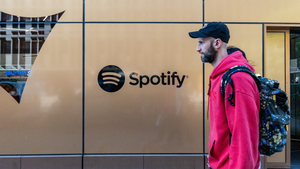It’s been a tricky year for people working at Spotify following the significant down-sizing undertaken by the company late last year, but at least the digital music business is standing by its work-from-anywhere policy, even as other tech companies start to force their employees back into the office. Unless you are an employee whose role involves a night-shift, in which case you can work anywhere but Sweden.
Spotify’s human resources boss Katarina Berg has given an interview to Raconteur where she speaks about that work-from-anywhere policy, the challenges it creates, and the impact of those job cuts on the employees that remained. The interview follows the recent ruling in the Swedish courts - reported last week by Swedish music business publication musikindustrin.se - that said Spotify doesn’t qualify for an exemption from the country’s ban on companies having employees work between midnight and 5am.
Asked about moves at the likes of Amazon and Dell to get their employees back into the office, Berg told Raconteur that Spotify is committed to the work-from-anywhere policy that was put in place during the COVID lockdowns. The other tech companies are “going back to what they know”, she says, but, she adds, “work is not a place you come to, it’s something you do”.
“We are a business that’s been digital from birth”, she goes on, “so why shouldn’t we give our people flexibility and freedom?” She then muses, “You can’t spend a lot of time hiring grown-ups and then treat them like children”. Allowing employees to work from home - or wherever they want - hasn't impacted on productivity or efficiency at Spotify, Berg adds. But that’s not to say it doesn't create some challenges.
“It is harder and we all struggle to collaborate in a virtual environment”, she concedes. “But does that mean that we will start forcing people to come into the office as soon as there is a trend for it? No”. Instead the company is working with the Stockholm School Of Economics to identify ways to overcome the challenges created by the work-from-anywhere policy.
Raconteur also asked Berg about last year’s down-sizing, which saw about 1500 people leave the company as management sought to convince investors that they were now as focused on achieving profitability as they are on securing yet more growth.
CEO Daniel Ek previously admitted that the cutbacks had more of an impact on the company than initially anticipated. “Spotify had been in hypergrowth and this was the only thing people knew”, Berg says of that impact. “A lot of people at Spotify had never seen a recession and it was a lot to absorb and digest”.
But what about the night shift? In Sweden, laws designed to protect the health of workers say that companies can’t force staff to work between midnight and 5am except where that work is essential to society. Spotify needs staff to monitor its platforms overnight and argued that that work serves the public interest, because if the platform goes down, that’s no fun for anyone trying to stream some tunes - or maybe even get some news from a podcast.
However, the Swedish Work Environment Authority disagreed that work was sufficiently important for Spotify to be exempt from the nightshift ban, and last month the country’s Administrative Court Of Appeal agreed. Which means, despite the work-from-anywhere policy, anyone doing night shift work at Spotify can't be in Sweden.
Actually, despite not qualifying for an exemption to the night shift ban, Spotify could still have night workers in Sweden if such a thing was collectively bargained with a union. But Spotify doesn’t want to do that, so it’s just moved the nighttime tasks to workers in other countries. Not that different from the rest of the tech sector then.

